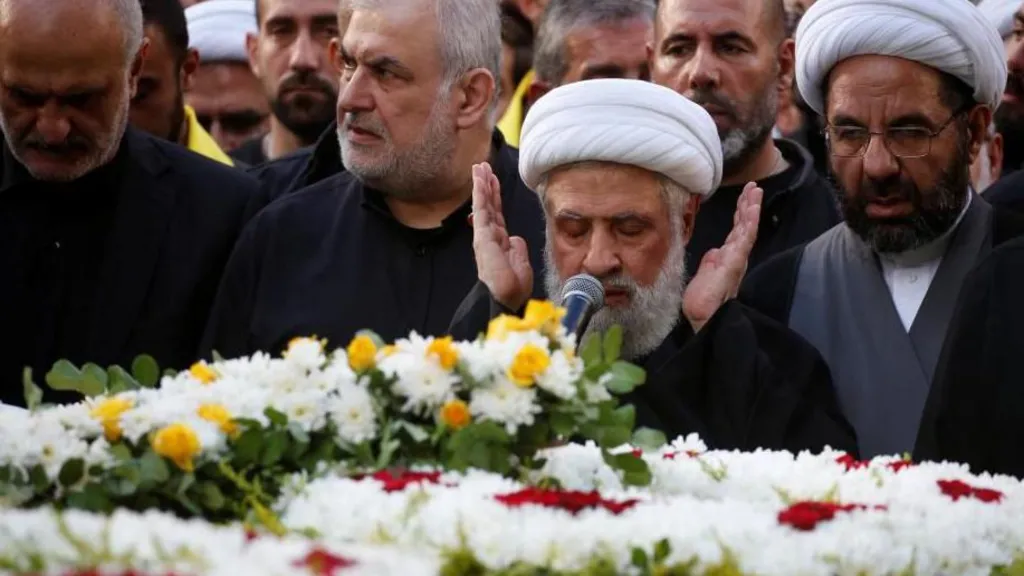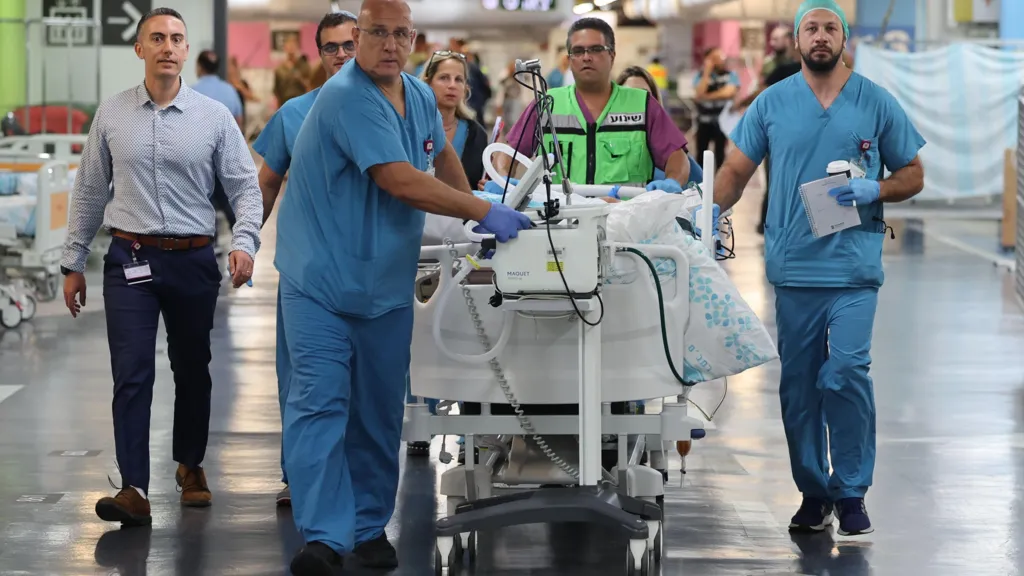Key Points:
- Intensifying Conflict:
- Israel and Hezbollah are escalating cross-border attacks, with around 150 rockets and missiles launched into Israel from Lebanon over the weekend.
- Some rockets reached as far as Haifa, forcing civilians into bomb shelters.
- Israeli Response:
- Israel retaliated with airstrikes targeting Hezbollah positions in southern Lebanon, claiming to have destroyed thousands of rocket launchers.
- Prime Minister Benjamin Netanyahu vowed to restore security along the Israel-Lebanon border and protect civilians.
- Hezbollah’s Defiance:
- Hezbollah’s deputy leader, Naim Qassem, declared that the group is ready to face all military possibilities after a high-ranking commander was killed in Israeli strikes.
- Civilian Impact:
- Lebanon reported 45 civilian deaths, including children, from an Israeli airstrike on Beirut.
- Civilians in northern Israel and Lebanon are on high alert, with schools closed and hospitals relocating patients underground.
- International Concern:
- The UN and world leaders, including the U.S., EU, and UK, have urged both sides to de-escalate. UN Secretary-General António Guterres warned of a potential “catastrophe” similar to Gaza’s devastation.
- Diplomatic efforts are calling for an immediate ceasefire to prevent further loss of life.
- Regional Spillover:
- Iran-backed militias in Iraq have launched missile and drone attacks against Israel, heightening fears of broader regional involvement.
- Both the U.S. and Jordan have advised their citizens to leave Lebanon as the situation deteriorates.

Escalation Between Israel-Hezbollah Sparks International Calls for De-escalation
Cross-border Attacks Intensify Amid Rising Tensions
Israel and Hezbollah are edging closer to an all-out war as both sides exchange heavy cross-border fire. Over the weekend, Israel’s military reported that around 150 rockets, missiles, and other projectiles were launched at Israeli territory from southern Lebanon, marking a significant escalation in the ongoing conflict. Many of the projectiles reached deeper into Israeli territory than previous attacks, with some striking near Haifa and forcing thousands of civilians into bomb shelters. The escalation is rooted in the intensifying violence that began on October 8, 2023, following a major attack on Israel by Hamas militants from Gaza, which provoked a response from Hezbollah.
Israel Responds with Retaliatory Strikes
In response to the barrage of rockets, Israel launched airstrikes targeting Hezbollah positions in southern Lebanon. According to the Israeli military, the strikes destroyed thousands of rocket launchers. Prime Minister Benjamin Netanyahu, addressing the nation on Sunday, vowed that Israel would take “whatever action is necessary” to ensure the safety of its citizens and restore security along the Israel-Lebanon border. He emphasized that Israel had dealt Hezbollah “a series of blows it could have never imagined.”
Despite these assertions, Hezbollah remains defiant. Speaking at the funeral of high-ranking Hezbollah commander Ibrahim Aqil, who was killed in an Israeli strike on Beirut, Hezbollah’s deputy leader Naim Qassem declared that the group was prepared to face “all military possibilities.” He characterized the conflict as having entered “a new phase” of open confrontation with Israel.
Humanitarian Concerns and Civilian Impact
Lebanese authorities reported that Israel’s airstrike on Beirut resulted in the deaths of 45 people, including children. The increasing civilian toll has prompted widespread condemnation and heightened international calls for a ceasefire. Thousands of families on both sides of the border remain in fear, with northern Israel on high alert. Schools in the area have been closed, and hospitals have relocated patients to underground facilities as rocket fire continues.
One resident from Kiryat Bialik, a city near Haifa, described the terrifying experience of waking up to rocket fire. “Around 6:30 AM, there was an alarm followed by a massive explosion,” they recounted. “The blast shattered windows in several homes nearby. It was incredibly loud and frightening.”
International Community Urges De-escalation
Amid the increasing violence, international leaders have called for restraint. United Nations Secretary-General Antonio Guterres voiced deep concern over the situation, warning of the potential for Lebanon to face devastation similar to that seen in Gaza. “The possibility of transforming Lebanon into another Gaza cannot be overlooked,” Guterres said in a televised interview.
Jeanine Hennis-Plasschaert, the UN’s Special Coordinator for Lebanon, echoed these concerns, warning that the Middle East was on the brink of a “catastrophic collapse.” She emphasized that there is no military solution to the conflict that would provide long-term security for either side.
The White House also weighed in, stating that further military escalation was not in Israel’s best interest. The European Union expressed “extreme concern” over the situation, while UK Foreign Secretary David Lammy urged both parties to agree to an immediate ceasefire to prevent further loss of life.
Regional Spillover and Broader Implications
The conflict is showing signs of spilling beyond Lebanon and Israel. Iran-backed militias in Iraq have begun launching cruise missile and drone attacks against Israeli targets. The Islamic Resistance in Iraq, a militant group supported by Iran, claimed responsibility for several of these attacks over the weekend. Israel’s Iron Dome system successfully intercepted many of these projectiles.
In response to the worsening security situation, the U.S. State Department issued new travel guidance, urging American citizens to leave Lebanon while commercial flights are still available. Neighboring Jordan also advised its citizens to evacuate as soon as possible.
As the situation continues to escalate, the fear of a broader regional conflict looms large. With Hezbollah threatening more aggressive action and Israel preparing for further military operations, the coming days could prove pivotal in determining the future of the Middle East’s already fragile stability.
